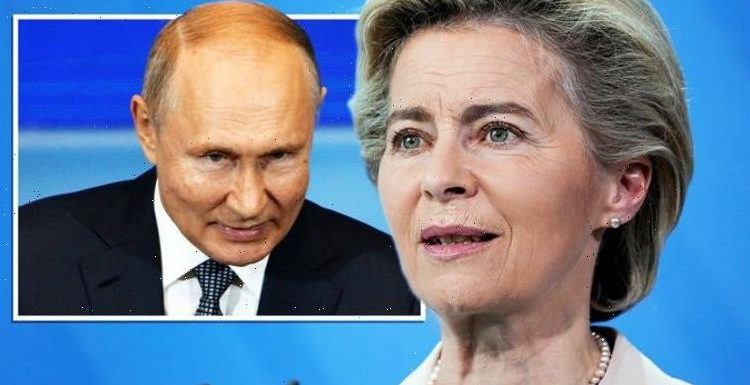
Expert accuses Russia of blackmailing Europe over gas trade
We use your sign-up to provide content in ways you’ve consented to and to improve our understanding of you. This may include adverts from us and 3rd parties based on our understanding. You can unsubscribe at any time. More info
In light of Europe’s deepening energy crunch, the European Commission said it will investigate measures to protect the internal energy market. The commission will look into the possibility of member states purchasing gas together. As many as 20 member states have already responded to the crisis by implementing countermeasures, such as tax cuts and aid for the poor.
Energy prices have risen by as much as 250 percent since January, with the spike attributed to a combination of dwindling gas supplies, increased demand for energy post-pandemic and the lacklustre output of renewables like wind and solar.
The situation has led to fears Europe is on track for a catastrophic winter.
Europe’s energy commissioner Kadri Simson said: “The current situation is extraordinary, but the internal energy market has benefited us for 20 years.”
The majority of Europe’s gas is imported from abroad, with Russia supplying a third of the continent’s supplies.


Europe’s reliance on Russia for gas has led to criticism of the Kremlin, with pundits accusing President Vladimir Putin of “weaponising” pipeline access to gain political leverage.
Russia has recently completed the Nord Stream 2 pipeline to Germany and has struck a 15-year deal to send gas to Hungary.
The Kremlin, however, has denied the accusations and the country’s state-owned energy corporation, Gazprom, said it has met all contractual obligations this year.
On Wednesday, President Putin said: “This is just politically motivated chatter, with no basis whatsoever.”
Emmanuel Macron says gas prices are providing 'strong pressure'
Ms Simson has now presented a toolbox of available options member states can implement to counteract the crisis, without breaking European law.
These include tax breaks, subsidies for small businesses and direct payments.
The European commissioner said: “It is important to support vulnerable citizens and European businesses as we come out of the pandemic and start the recovery.
“The Commission is helping member states to take immediate action to mitigate the consequences for citizens and businesses this winter.”


Gas prices in Europe hit a record high in the past few weeks, sparking concern for the cold months ahead.
Gas that flows into Europe from outside pipelines is stored in regional hubs and then distributed across the continent.
However, some experts fear there won’t be enough gas going around come winter.
Fatih Birol, executive director of the Paris-based International Energy Agency, has said Russia could supply an additional 15 percent of gas to meet Europe’s demand.
Mr Birol has also warned the transition towards green energy is far too slow and has contributed to the energy crunch.
Coming out of the pandemic, the world as a whole is experiencing an increased demand for gas, oil and coal.
In Europe, the gradual transition to net-zero industries has also taken a toll on the cost of fossil fuels.
Mr Birol said: “We are not investing enough to meet future energy needs, and the uncertainties are setting the stage for a volatile period ahead.
“The way to address this mismatch is clear — a major boost in clean energy investment, across all technologies and all markets. But this needs to happen quickly.”
Additional reporting by Monika Pallenberg.
Source: Read Full Article